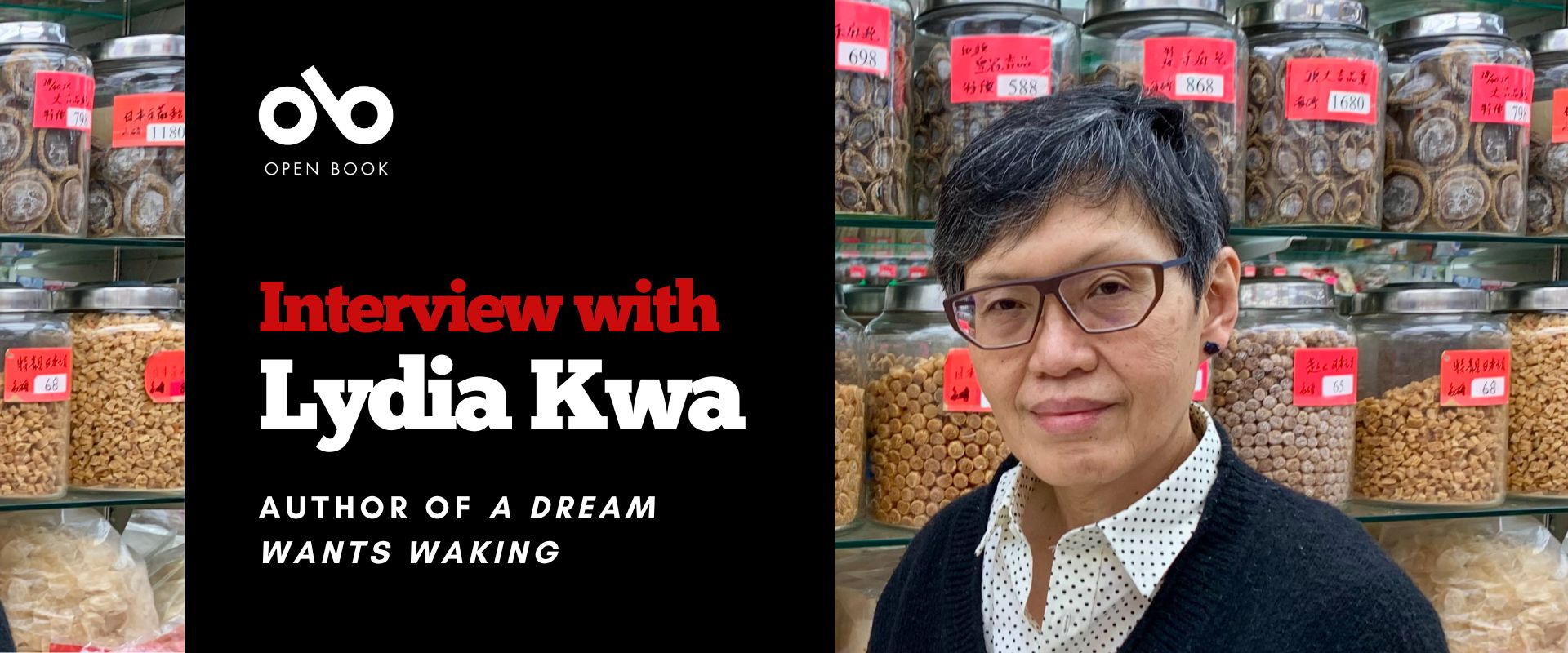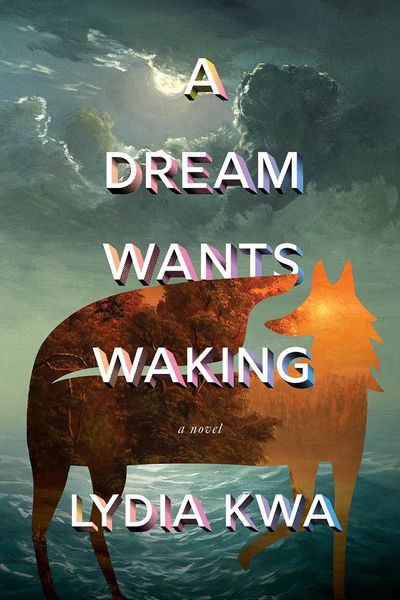"I Dedicated This Novel to Our Nonhuman Kin" Lydia Kwa on Her New Novel Blending Chinese Myth & a Chilling AI Future
Nearly two hundred years in the future, the half-human, half-fox spirit Yinhe finds herself in her newest incarnation, plunged into Luoyang, a city still reeling after the great cataclysm. The city is fracturing, with No. 1—the government artificial intelligence that rules the area—suddenly becoming erratic in its behaviour.
Yinhe is the irresistible protagonist of Lydia Kwa's A Dream Wants Waking (Wolsak & Wynn), a unique blend of speculative fiction and Chinese myth that explores the haunting possibilities of AI alongside Yinhe's moving journey of hope and reconnection.
Summoned to the Dream Zone with her fellow chimeras, Yinhe finds herself at the centre of an effort to change everything in Luoyang, and even more importantly for her, to make a fateful decision that could potentially reunite her with her long-lost soulmate, for whom she's been searching for a dozen lifetimes.
Lush, thoughtful, and absorbing, A Dream Wants Waking is a unique novel that showcases Kwa's impressive chops in world building and sharp, smart lyricism, seen previously in her other books of poetry and fiction, including Oracle Bone and The Walking Boy.
We're speaking with her today as part of our Long Story interview series for novelists, and she tells us about how the novel's conclusion felt so inevitable that she "experience[d] the last scene as if [she] was in it [her]self", about the delightful Chinese meaning of Yinhe's name, and about how her choice of dedication was intended to "highlight the importance of our relationships to the rest of our universe, how interconnected we all are".
Open Book:
Do you remember how your first started this novel or the very first bit of writing you did for it?
Lydia Kwa:
Yes, I remember the first writing I did for A Dream Wants Waking. I had started a notebook for the project, and the first page was dated 18/4/2017. Right below the date were a few phrases: "Silver streak in hair"; "Qilan's reincarnation"; and "Tunnels through to the ocean." Three days later, I wrote a scene which did not appear exactly in the final manuscript; but it had notions of being visited by dreams; and particularly about tunnels.
Even though this first attempt at writing didn't appear eventually in the finished manuscript, the ideas in them became seeds for development into what was to become parts of the narrative. The detail about the silver streak in hair did get incorporated into the main protagonist's physical appearance, and she was indeed the reincarnation of Qilan, a character I first wrote about in Oracle Bone.
OB:
How did you choose the setting of your novel? What connection, if any, did you have to the setting when you began writing?
LK:
I had written two previous novels set in Chang'an, the Western Capital of China during the Tang dynasty. I chose to set A Dream Wants Waking in a mythical rendition of twenty-third century Luoyang, which historically had been the Eastern Capital at various points during the Tang dynasty. Even though the original idea was to create a novel that was the third and last book in a trilogy, A Dream Wants Waking became a narrative propulsion toward a strong speculative/science fictional direction, while weaving threads between the characters and those that appeared in Oracle Bone and The Walking Boy.
Your CanLit News
Subscribe to Open Book’s newsletter to get local book events, literary content, writing tips, and more in your inbox
OB:
Did the ending of your novel change at all through your drafts? If so, how?
LK:
Writing the ending felt as if I was being led to it. I mean, it felt inevitable. It was as if weaving all those narrative threads brought me to a clear notion of how the ending needed to be. Actually, I didn't so much "plan" it as experience the last scene as if I was in it myself. That said, of course I later revised some details of the scene; but not the overall ending.
OB:
Did you find yourself having a "favourite" amongst your characters? If so, who was it and why?
LK:
Even though I love all the characters in A Dream Wants Waking, my favourite remains Yinhe, the main protagonist, whose name means "Milky Way" in Chinese. She's my favourite because she is a half-human half-fox spirit who moves through various incarnations and is a complex being. She is magical, powerful, deeply caring yet plagued by unresolved regrets and disturbing dreams.
OB:
If you had to describe your book in one sentence, what would you say?
LK:
It is the hybrid child of Osamu Tezuka the Japanese manga artist, and Pu Songling, a radical storyteller of strange tales who lived during the Qing dynasty in China.
OB:
What was the strangest or most memorable moment or experience during the writing process for you?
LK:
There were many memorable moments. But I would have to say that the strangest and most memorable one happened as I entered the last scene. It felt as if I was right there, living through it, in some magical place outside of space and time. It surprised me, what occurred in that scene. It made me gasp and brought tears to my eyes.
OB:
Who did you dedicate your novel to, and why?
LK:
I dedicated this novel to our nonhuman kin. That's because this novel explores our relationships with other creatures, some of whom possess sentience, clairsentience, and personhood. In the speculative fictional world of A Dream Wants Waking, our nonhuman kin include chimeric creatures, a divine turtle, trees, bones, the sky, and the ocean. I wanted to highlight the importance of our relationships to the rest of our universe, how interconnected we all are.
_____________________________________________________
Lydia Kwa was born in Singapore but moved to Toronto to begin studies in Psychology at the University of Toronto in 1980. After finishing her graduate studies in Clinical Psychology at Queen’s University in Kingston, she moved to Calgary, Alberta; then to Vancouver, BC, and has lived and worked here on the traditional and unceded territories of the Coast Salish peoples since 1992. Kwa has published two books of poetry (The Colours of Heroines, 1992; sinuous, 2013) and four novels (This Place Called Absence, 2000; The Walking Boy, 2005 and 2019; Pulse, 2010 and 2014; Oracle Bone, 2017). Her next novel, A Dream Wants Waking, was published by Buckrider Books, an imprint of Wolsak & Wynn, in Fall 2023. A third book of poetry from time to new will be published by Gordon Hill Press in Fall 2024. She won the Earle Birney Poetry Prize in 2018; and her novels have been nominated for several awards, including the Lambda Literary Award for Fiction. She has also exhibited her artwork at Centre A (2014) and Massy Art Gallery (2018) and has self-published two poetry-visual art chapbooks. An essay “The Wheel of Life: From Paradigm to Presence” appears in the art catalogue In the Present Moment: Buddhism, Contemporary Art, and Social Practice by Haema Sivanesan (Art Gallery of Greater Victoria, 2022).






